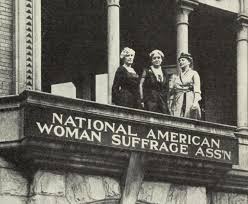Woman’s Suffrage on This Day

Beginning in the mid-19th century, several generations of ‘Woman Suffrage’ supporters lectured, wrote, marched, lobbied and practiced civil disobedience to achieve what many Americans at the time considered a radical change in the Constitution, guaranteeing women the right to vote. Woman’s suffrage on this day opened this dialogue.
On This Day
On January 10, 1878, California Senator Aaron Sargent (whose wife, suffragist Ellen Clark Sargent and friend to Susan B. Anthony) introduced a resolution for an amendment to the Constitution to provide for woman suffrage: “The right of citizens of the United States to vote shall not be denied or abridged by the United States or by any State on account of sex.” Sargent requested that his colleagues take the unusual step and allow suffragists to address members of the Senate personally. “We ask that women may be permitted in person, and on behalf of the thousands of other women who are petitioning Congress…to be heard…before the Senate and House.”
Women’s Voices Were Heard
The following day suffragists testified before members of the Senate Committee on Privileges and Elections. “One half of our human family are women,” stated Stanton. The Constitution provides for a government “of the people,” she explained.
Never Giving in Never Giving Up
Champions of voting rights for women worked tirelessly between 1878, when first introduced and August 18, 1920, when it was finally ratified. Between that time some pursued suffrage acts per state. Nine western states adopted woman suffrage legislation by 1912.
United By One Cause
By 1916, almost all of the major suffrage organizations were united behind the goal of a constitutional amendment. The political balance began to shift once New York adopted woman suffrage in 1917. It was then when President Wilson changed his position to support the amendment in 1918. On May 21, 1919, some 40 plus years later the House of Representatives passed the amendment followed by Senate approval 2 weeks later.
The campaign for woman suffrage was long, difficult, brutal, and dramatic. Yet ratification did not ensure all women’s right to vote. Decades of struggle still continued for minority women’s voting rights.
Cardinal Staffing – A Woman’s vision
Since 1994 Cardinal Staffing Services understands businesses, and our candidate needs within our communities. We are in your neighborhoods; we know your communities because we live in them. Are you looking for employees? Are you looking for that new job? We are your best source to find what you need locally. What are you waiting for? www.cardinalstaffing.com